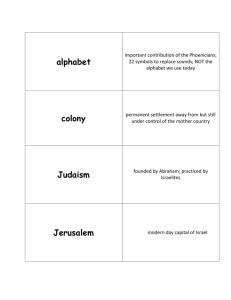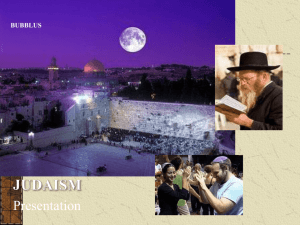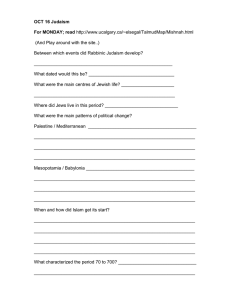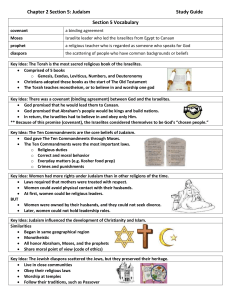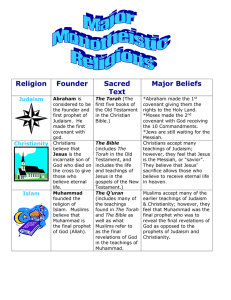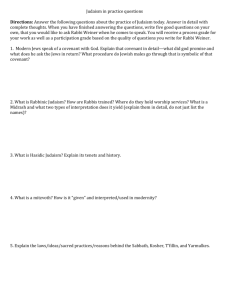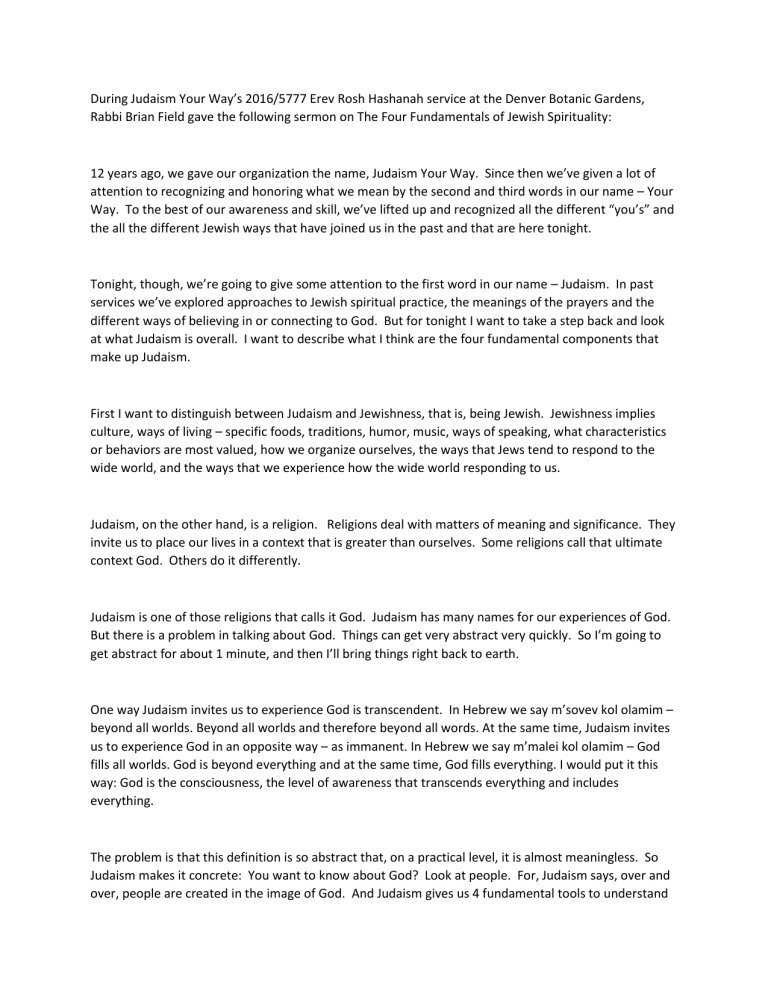
During Judaism Your Way’s 2016/5777 Erev Rosh Hashanah service at the Denver Botanic Gardens, Rabbi Brian Field gave the following sermon on The Four Fundamentals of Jewish Spirituality: 12 years ago, we gave our organization the name, Judaism Your Way. Since then we’ve given a lot of attention to recognizing and honoring what we mean by the second and third words in our name – Your Way. To the best of our awareness and skill, we’ve lifted up and recognized all the different “you’s” and the all the different Jewish ways that have joined us in the past and that are here tonight. Tonight, though, we’re going to give some attention to the first word in our name – Judaism. In past services we’ve explored approaches to Jewish spiritual practice, the meanings of the prayers and the different ways of believing in or connecting to God. But for tonight I want to take a step back and look at what Judaism is overall. I want to describe what I think are the four fundamental components that make up Judaism. First I want to distinguish between Judaism and Jewishness, that is, being Jewish. Jewishness implies culture, ways of living – specific foods, traditions, humor, music, ways of speaking, what characteristics or behaviors are most valued, how we organize ourselves, the ways that Jews tend to respond to the wide world, and the ways that we experience how the wide world responding to us. Judaism, on the other hand, is a religion. Religions deal with matters of meaning and significance. They invite us to place our lives in a context that is greater than ourselves. Some religions call that ultimate context God. Others do it differently. Judaism is one of those religions that calls it God. Judaism has many names for our experiences of God. But there is a problem in talking about God. Things can get very abstract very quickly. So I’m going to get abstract for about 1 minute, and then I’ll bring things right back to earth. One way Judaism invites us to experience God is transcendent. In Hebrew we say m’sovev kol olamim – beyond all worlds. Beyond all worlds and therefore beyond all words. At the same time, Judaism invites us to experience God in an opposite way – as immanent. In Hebrew we say m’malei kol olamim – God fills all worlds. God is beyond everything and at the same time, God fills everything. I would put it this way: God is the consciousness, the level of awareness that transcends everything and includes everything. The problem is that this definition is so abstract that, on a practical level, it is almost meaningless. So Judaism makes it concrete: You want to know about God? Look at people. For, Judaism says, over and over, people are created in the image of God. And Judaism gives us 4 fundamental tools to understand how to be a person created in the image of God. They are: 1) covenant/brit; 2) Torah; 3) mitzvah and 4) teshuvah. Brit/Covenant The first component of Judaism is covenant, or in Hebrew, brit. Covenant is a fancy word for sacred relationship. We all have these kind of relationships in our lives. Marriage is called a covenant. Parents have a covenantal relationship with their children. Teachers have a covenantal relationship with their students. Covenantal relationships are relationships that matter so much that they shape who we are. They channel our deep caring and give expression to our humanity. Spiritually Jews can experience covenant in their relationship with God. Jews can also experience covenant in our relationship with the Jewish people. The Talmud observes – Kol Yisrael arevim zeh l’zeh, that is – “All the Jewish people are responsible to and for each other.” Jews also experience covenant with all human beings – as the Torah says V’ahavta l’re-acha kamocha,“ – “Love your neighbor as yourself.” Jews can experience covenant through relationship to the Promised Land, the land of Israel. And increasingly, Jews, like all human beings, are being called to experience covenant through our relationship with the whole earth. In all of these dimensions, covenant undergirds the human being with a sense of belonging, or interdependence. Covenant reminds us that we are not alone, that we are part of relationships that fundamentally matter, and therefore that it matters what we do. One ritual that expresses covenant most poignantly is a baby naming, which literally is called a brit or a bris, that is – a covenant ceremony. A baby is welcomed into life by bringing them into the covenant. That’s the deep meaning of the name, the Jewish or Hebrew name that the child is given. They may have already been given an English-language name, but this name is their covenantal name, the name by which they will be called to the Torah at their bat or bar mitzvah, a name that can call them to their covenantal awareness, a name, that when spoken, reminds them that they are part of something bigger than themselves. That’s covenant. Torah The second fundamental component of Judaism is Torah. It’s one thing to say that we’re in covenant but what informs the contours of that covenant? What determines its shape? What is its content? When 2 people get married, as part of their covenanting ceremony, they make vows to each other. In one sense, this is Torah: the covenantal vows between the Jewish people and God, humanity and the earth. Torah is the Jewish people’s ongoing discovery of more and more complete answers to the fundamental question about what it means to be in covenant, to be in sacred relationships that fundamentally matter. Since I am in covenantal relationship with all people, therefore, at this moment I should _________. This is Torah. Since I am in covenantal relationship with God, therefore, at this moment I should ________. This is Torah. Since I am in covenantal relationship with the earth, therefore, at this moment I should________. This is Torah. When people talk about Torah, they may think they are referring to something that was written thousands of years ago, which Jews reverently read at sacred gatherings. But that’s not true. What’s written on the parchment in the Torah scroll is just the doorway to Torah. The words that are written are just the prompt, the opening in the conversation. The covenantal conversation that’s been continuing for over three thousand years – that’s Torah. How do I know this? Inherent in the very word Torah are the words that describe two kinds of covenantal relationships. The Hebrew word Torah adderall shares the same root as the word for parents – horim – and the word for teacher – moreh or morah. In other words Torah is an expression of what parents and teachers do, of who they are when they are parenting, when they are teaching. For it is through our parents and our teachers that each of us first learns and experiences what it is to be a person. The root of these 3 words – morah, horim and Torah – l’horot – means “to shoot” as in – to shoot a bow and arrow. The poet Kahlil Gibran is describing Torah when he says to parents, “You are the bows from which your children as living arrows are sent forth. The archer sees the mark upon the path of the infinite, and He bends you with His might that His arrows may go swift and far.” Every one of us is an arrow flying forward from the bow of a teacher or a parent or even a recent conversation. And every one of us is a bow sending forth arrows into the future – in the form of our children, our students, the people with whom we are in relationship, and even our future selves. So let’s sum up so far. Human beings are human by virtue of our being in covenantal relationships with other human beings, with the earth, and with God. And Torah is our evolving understanding of what that practically means. Mitzvah The third fundamental component is mitzvah. If Torah is our understanding of being in covenant, mitzvah is our acting out of being in covenant. The classic translation of mitzvah is commandment. At the heart of any relationship that matters, there is a commanding voice. If this relationship matters, then at this moment you should ____________.” For a married couple, for example, thou shalt remember thy anniversary. For a parent, thou shalt get out of bed and answer thy child when she is crying in the middle of the night. It’s not a commandment in the sense that a Supreme Being is ordering you to. It’s a commandment in the sense that you can’t conceive of not doing it by virtue of the nature of the relationship itself. A mitzvah is a specific act at a specific moment. It is a decision to act or not to act, to do or not to do. It is an act that in its doing, reinforces the covenantal relationship. More than a command-ment, then, a mitzvah is a covenant – enhancer. If you are in covenant with humanity, what is it that you must now do, that you cannot conceive of not doing? That is your mitzvah. If you are in covenant with the Earth, what is it that you must now do, that you cannot conceive of not doing? That is your mitzvah. If you are in covenant with God, what is it that you must now do, that you cannot conceive of not doing? That is your mitzvah. Anything and everything we do can be experienced through the lens of mitzvah. How we speak. What we speak about. What we eat. How we spend our money. How we spend our time. How we interact with each other. How we disagree. Teshuvah The fourth fundamental component of Judaism is teshuvah. Teshuvah literally means response, and it also means to turn. Teshvuah is our response to the question: What happens when we get off track? What happens when we are out of integrity? What happens when we have undermined some aspect of our covenantal relationships? What happens when we find ourselves isolated and separate, hurt or having caused hurt, our perspective ego-centric, our spirits contracted, our bodies clenched. How do we self-correct? We turn. Teshuvah. Deep down, that’s what these ten days from Rosh HaShanah through Yom Kippur are for. Indeed the ancient rabbis termed these days Aseret Y’mei ha-Teshuvah – the Ten Days of Teshuvah. Rosh HaShanah is where we look and see where we are. It is the Day of Judgment, the day of discernment, the day of seeing the truth, and the day we begin to respond to the truth that we have seen. We turn, we return to who we really are – created in the image of God to be in and act out of covenantal relationship with human beings, with the Earth and with the One who is eternally in covenantal relationship with us. If Rosh HaShanah is the Day of Judgment, then Yom Kippur is the day of grace, the day of forgiveness. We are forgiven for the teshuvah that we have not yet been able to complete on our own. Because any relationship that matters is not simply about doing, it’s also about forgiving what can’t yet be done. And sometimes it is the act of forgiving that permits teshuvah to begin again. Conclusion So to summarize. The four fundamental components of Judaism are: Brit/Covenant – we are, each of us, part of relationships that matter, including relationship with the Earth and the One who calls us into being Torah –the arrow and the bow and the flight of the arrow, our covenantal vows, the ongoing intergenerational conversation about what it means to live into covenant Mitzvah – the decisions and actions that express and enhance being in covenant Teshuvah – the work, the hard work of course correction when we get off track. Here we are, the first day of the new year, 5777. We may feel divided from each other. But deep deep down we know that is but a very partial truth. Deep down we are connected. We are in a covenant with each other and with the Earth and with the One who is continually calling us into covenant with each other and with the Earth. That’s the deepest human truth that Judaism calls us to witness. So now what will we do? What is the one thing we cannot not do? What will we do when we depart this sacred space? What will we do about those places in our lives where we are off course? What will we do about those places in our lives where we are hurting and isolated? Will we take steps to return? Even when those steps are the hardest thing we have ever done? And when they are too hard, can we ask for help? That’s the purpose of our next prayer, Avinu Malkeinu. Let us rise, and help each other, ask for the help each of us needs to respond, to return. https://www.weekendpost.co.bw/25378/columns/the-bible-and-the-torah-in-islam/
